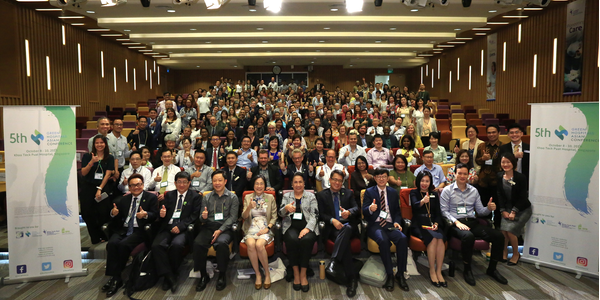

Last week, REEI's project team (Zhao Ang, Lin Jiaqiao co-director of REEI and Jiang Chao project manager of REEI) was invited to participate in the 5th Green Hospitals Asian Conference by the HCWH( Asia) and the Qiu Debao Hospital in Singapore. Representatives from more than 200 hospitals, environmental and healthcare institutions from around the world participated in the conference and held plenary sessions and parallel forums on topics such as climate change and health, waste management, sustainable food, energy and construction. The meeting also held a panel discussion on October 8 on three key issues of sustainable procurement, medical plastics and air pollution in the health sector.

Figure 1: Conference theme announcement
GHAC is an important meeting for Asian regional health care institutions and stakeholders to discuss environmental health and sustainability issues related to the health sector. The 5th GHAC on the theme of “Towards a sustainable ,climate-resilient Asian healthcare” provides a platform for medical and health institutions to share experiences in green hospital construction, and will practice green hospitals and global environmental governance. Link up to raise the importance of all sectors for the development of climate-smart medical care.
As the first attempt in related fields in China, REEI and CEC began to develop the “Guidelines for Sustainable Evaluation of Medical Institutions” since the beginning of 2019, and the project manager of REEI project, Jiang Chao, represented the project team at the conference. The sustainable procurement section introduced the first draft of the just completed guidelines.

Figure 2: Jiang Chao is participating in the discussion
In recent years, air pollution has become more and more serious in many countries in Asia, and air pollution has established the most intuitive connection between environment and health. In India, South Africa and other places, environmental organizations work with local medical institutions to raise awareness of air pollution issues by the public and policy makers through air pollution monitoring. In the air pollution research unit of the conference, organizations from India, South Africa, the Philippines and the United States introduced their respective actions in response to air pollution. Lin Jiaqiao,Co-director of REEI, also shared with China the experience and achievements of China in dealing with air pollution.

Figure 3: Lin Jiaqiao is sharing
Zhao Ang, Co-director of REEI, as one of the main members of the preparatory committee of the conference, made a concluding speech for the conference. Director Zhao Ang first congratulated the success of the conference and emphasized the important role played by the conference in promoting the exchanges and cooperation between medical and health institutions in the field of green hospitals. It also focused on sharing the feelings of sustainable food. Sustainable food was one of the main concerns of the conference. The experts introduced the relationship between vegetarianism and health and climate change mitigation, and shared ways and examples of promoting healthy low-carbon diets in health care institutions.

Figure 4: Zhao Ang is speaking
On the last day of the meeting, the participants visited Qiu Debiao Hospital. The courtyard is full of trees, flowers are blooming, and the open space is used to carry out the greening of the courtyard. It is called “the courtyard in the courtyard and the courtyard in the courtyard”. Qiu Debiao Hospital has carried out a lot of work in related fields of green hospitals such as energy conservation, food, garbage disposal and resource conservation. More than 50 kinds of vegetables and fruits are planted in the hospital's roof garden, which not only serves the restaurants in the hospital, but also has the remaining sales. Such an environmental atmosphere can also reduce the tension and anxiety brought by the hospital and play a positive role in the rehabilitation of the patient.
Conclusion:
Climate change is considered the biggest health threat facing the world in the 21st century. The newly released “Medical Health Sector Carbon Footprint” report states that the global health sector accounts for about 4.4% of global carbon emissions [1]. The health sector plays an important role in the response to climate change. On the one hand, extreme weather caused by climate change can damage health infrastructure, while the health sector also has to deal with diseases and health damage caused by climate change; on the other hand, the health sector can mitigate climate change by reducing its own carbon emissions. Building a climate-smart medical and health system is a problem that we urgently need to face and solve, both from the perspective of the medical institution's own needs and global environmental governance.
尾注:
[1]HCWH, ARUP, 2019. Health Care’s ClimateFootprint, How the Health Sector Contributes to the Global Climate Crisis andOpportunities for Action. https://noharm-uscanada.org/ClimateFootprintReport.




